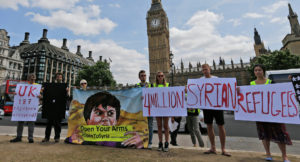UK’s refugee settlement system under fire
Thousands of refugees face homelessness and destitution in the UK because of the country’s ‘two-tier’ system of resettling refugees and asylum seekers, according to a new UK parliamentary report.
The report criticised the system which gives just 28 days’ government support to asylum seekers after their asylum claims are granted.
The ‘all-party parliamentary group on refugees’ report says people brought to the UK via resettlement schemes receive more support than those given refugee status after arriving as asylum seekers.
More than 50,000 refugees are said to have arrived in the UK through the asylum route since 2012, while government-led resettlement programs, including from Syria, accounted for fewer than 10,000 people in the same period.
The report says the next government should create a minister for refugees to help level the playing field.
It says the ‘two tier’ system is leading to “stress and despair” among newly-recognised refugees as they struggle to access housing and benefits.
And the those problems are exacerbated by administrative delays, patchy English language provision and a lack of employment, skills support and UK-wide integration strategy.
“Those refugees who have come through the asylum route will have faced the same persecution and violence as those who are resettled,” the report says.
“That two refugees who could have fled from the same country, the same town, even the same neighbourhood could have such different experiences of what it means to be a refugee in the UK is unacceptable,” it says.
The report found “worrying” delays in the issuing of National Insurance numbers — necessary for newly recognised refugees to be able to gain access to finance and housing once their asylum support is ended — which is resulting in newly-recognised refugees becoming destitute.
It found found that JobCentre staff who are dealing with refugees did not always provide the right information or have awareness of the correct procedures, leading to delays in refugees being able to access support.
Refugees also face problems opening bank accounts, frequently as a result of being unable to provide documentation banks ask for, the report said.
It also found that many female refugees were at risk of sexual and gender based violence once they arrive in the UK, due to being financially dependent on a partner and facing barriers to services such as English language classes.
 In contrast, people who come to the UK under a resettlement package can expect to stay for five years, after which they can apply to settle in the UK. And they receive an extra 12 hours a week of English language tuition, for up to six months.
In contrast, people who come to the UK under a resettlement package can expect to stay for five years, after which they can apply to settle in the UK. And they receive an extra 12 hours a week of English language tuition, for up to six months.
Local councils are also be paid £8,500 ($xxx) by the government for each refugee in their first year to go towards housing, healthcare and other costs. That figure tapers to £1,000 by the fifth year.
The report said those levels of support – and an integration scheme run by the Scottish Government – were examples of good practice that could be replicated for refugees more widely.
A dedicated minister for refugees would be able to oversee the improvements needed, it said.
The chairwoman of the all-party group, Labour MP Thangam Debbonaire, said the current system was morally wrong and also a missed opportunity.
“Creating a two-tier system for refugees, loading the dice against people who come here to build a new life, is not just the wrong thing to do, but a costly missed opportunity for Britain,” Ms Debbonaire said.
She said most refugees wanted to return home when conflict was over but wanted to contribute to this country in the meantime.
“These are often skilled professionals and, by definition, they all have strength and determination to offer,” she said.
Even Conservative MP David Burrowes, the parliamentary group’s vice-chairman, said that for too many refugees, “being granted their status is the beginning of a period characterised by homelessness and destitution”.
“Protection must mean more than just a piece of paper,” he said.
UK NGOs have called for all parties to commit to increased funding for English language courses for refugees.
They say the new government must enable all refugees in Britain to successfully rebuild their lives.
Maurice Wren, the Chief Executive of the UK’s Refugee Council Maurice Wren said it was “unacceptable that the Government treats refugees unequally by offering a relative few the necessary help and support they need to integrate into British life while simultaneously consigning another much larger group to the risk of homelessness, hunger and despair”.
“These are people who have fled the same bombs and the same bullets; it’s vital the Government recognises that they need the same support to begin rebuilding their lives,” Mr Wren said.
Laurie Nowell
AMES Australia Senior Journalist












